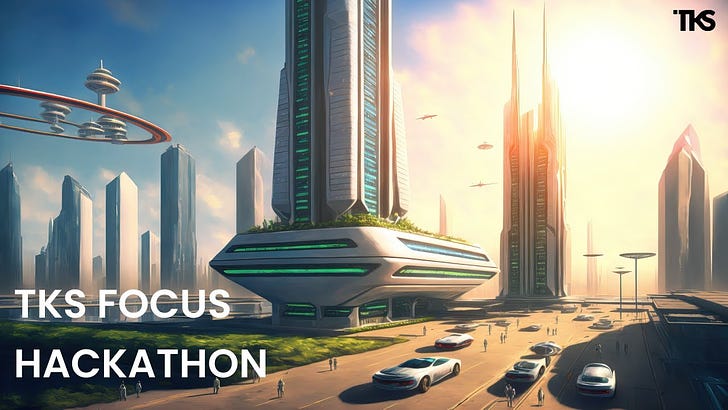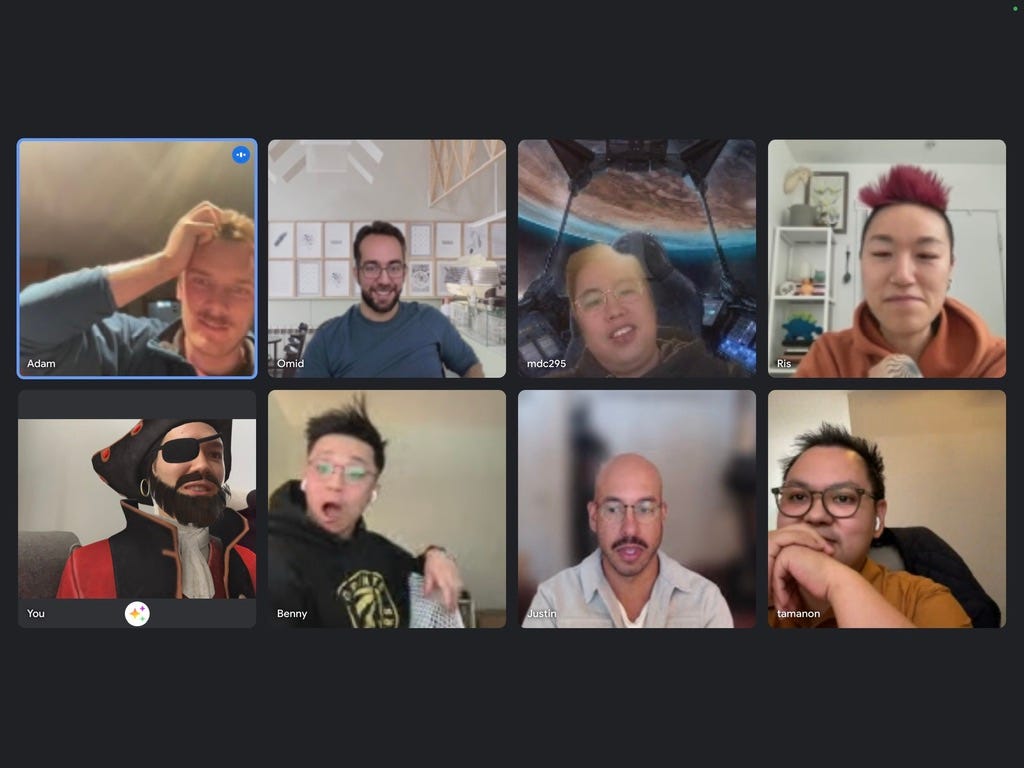What do you get when you combine 500 ambitious students, a passion for emerging technologies, and the opportunity to impact millions?
This past weekend close to 100 teams at TKS competed in the Focus Hackathon. They had 24 hours to come up with a novel use of technology to solve a meaningful problem the world is facing. In small groups, they combined the areas they have been researching and building to solve important problems. For example, if I've been going deep into Gene Editing and you've been studying the major issues with the Climate, we might combine those areas to see how gene editing might be able to benefit the climate. Or maybe we are combining AI with personalized medicine to create a better experience for patients. Students were able to go deeper and get more technical than the last hackathon thanks to the months of extra experience they have!
Throughout the weekend I was inspired by the time and energy students were putting into this project. As I wrote about during the last hackathon, I kind of miss the intense pressure and progress that comes with a project like this.
Teams worked on problems such as using biomarkers in your voice to predict early onset Parkinson's and allow those patients to get treatment while they still have the majority of their dopamine neurons, or a way to use drones & image classification to detect crop diseases in farms from above, allowing farmers to identify and hopefully solve the problems quickly.
On Sunday morning I was on my couch with my partner and our dogs, watching the livestream on our TV 🤓. Students presented to a panel of judges to get tough questions and feedback on their ideas.
As I watched I couldn’t help but feel like I could have done more for the teams I was coaching. The ideas and presentations weren’t as good as they could have been, we know what the students are capable of. Each time I do this I find new things for me to focus on and improve for the next iteration. It’s just like we tell the students: our goal is to be making new mistakes each time, not old ones.
In my reflections on the weekend, I noticed a small but big theme that was woven through the weekend and the majority of submissions: mixing up the measure and the goal.
Keeping goals front of mind
When we set goals for ourselves, it's helpful to have a specific way to measure whether we are making progress or not. If you want to get stronger, it might be the actual weight you lift or the number of times you visit the gym in a week.
Let's say my goal is to get a speaking opportunity at a major conference and I’m measuring progress based on how many conference organizers I email. I start to email a few each day and check that box for myself. I feel like I’m making progress – and I am! I’m taking steps that put me closer to speaking at a conference. Fast forward a few weeks, and every morning after I wake up I am blasting off a few emails, dusting off my hands, and thinking I’m closer to speaking at a conference. At some point in the process, I forgot why I was emailing these people and started treating that metric as my goal. At some point sending those emails stopped getting me closer to my goal and started being something easy I could focus on.
When we don't have a clear view of why we are doing something or what we want to achieve, we fill in this gap with what's readily at hand. For some of us, we look at what other people are doing. For others, it's we pick what’s easily measured.
This past weekend, students (and myself) mixed up the measure — judging criteria—with the goal: find exciting, novel uses of technology to solve real problems in the world. Instead of thinking hard about what problems exist in the world, how big they are, and how to make the biggest impact, many students tried mashing together technologies to come up with cool ideas. There wasn’t enough time spent asking: is this problem worth solving? Will this solution solve the problem? Is this even possible?
It can be hard not to start with the idea. When you're excited about the technology and you're placed in this competitive environment, it's hard not to try to "win". You try to think of things that are impressive instead of impactful. This is something I can try to frame better for my students next time.
To be clear, I don't want to diminish the work of the students. They spent 24h working really hard on their ideas and that's valuable and admirable. When else are students working that hard on things by choice? But as with all things at TKS, it's a learning opportunity to grow and get better for next time.
For me, it’s doing a better job of pushing students to think about more impactful solutions and going way deeper into how it works. We have 24 hours! That’s more than enough to explain complex ideas. For that, I need to remind myself to be wearing my coach hat at all times. I also want to be intentional about reminding students why we do hackathons. It’s not to win a contest, but to create the first iteration of an exciting project that can impact the lives of millions. This is what we came here to do!! Hackathons might feel like a “contest” in the midst of the program, but they are also the first step in the mission many students entered the program with.
Activating the things you want
What is something you want to happen?
Maybe it's to hang out with your friends more. Maybe it's spending time with family. Maybe it's reading a book or reaching out to an old friend. Or maybe it's trying that new workout class. (Yes, you know I'm talking to you!)
Whatever it is, I want you to do something about it right now.
Seriously.
I don’t care what it is, just take two minutes and do something.
Our mindset of the week was being an Activator.
So many of us wait for others to initiate things – but if we're all waiting for someone else, then nothing happens.
Why can’t you be the first one to get things moving?
Around the holidays I was having a virtual hang with a couple of friends and I thought "we should do another one of these with more people". And so a few hours later, I posted on a discord server that we were going to have a meetup. I set the time, created a Google Meet link, and just opened the invite to whoever could make it. I could have spent more time organizing and planning, but I know overthinking always gets in the way, and done is better than perfect.
Get going and then get good.
The worst case is plans fall through, nobody shows up, but now you're back where you started. The best-case scenario is you get to hang out with friends.
We had around 11 people show up throughout the hour and just caught up on our lives. I had a fun hour hearing about what people were up to, something I wouldn’t have normally done. And that all happened because I just decided to activate it.
And the same thing happened at the start of covid1. I sent an email to my cohort from university and ended up kicking off a 70+ email conversation of people giving their life updates! #bringbackchainletters
It’s not hard to be someone who does these things! All you need to do is have a tiny spark and take advantage of it. This is me giving you that spark.
Challenge for you: What can you activate today?
🔗 Interesting Links
Vall-e by Microsoft: Microsoft released a paper about their VALL-E tech which uses an LLM (large language model) to train a text-to-speech algorithm. This allows it to artificially replicate voices with as little as 3-seconds of an original recording. Combine this with ChatGPT and you may never need to take a phone call again 😂
Project Unlock: Lowes has been experiencing a lot of power tool theft and so they are trying to combat that by using technology. Like when you buy a gift card, power tools will be disabled by default and will need to be activated at the point of purchase using RFID technology. In addition, it will be registered to the blockchain so any second-hand buyers will be able to confirm that the product was legitimately purchased. Whether this is necessary or not, it’s cool to see Lowes embracing different technologies to solve their problems.
Hannah Ritchie on eating local: No relation here between me and Hannah, but she writes a great Substack each week as part of her work at The World in Data. Hannah was recently on EconTalk where she talked about eating local and some of the future of food. I found it to be an interesting introduction to the topic and think you might find it interesting if you’re trying to eat more sustainably.
BCIs for Telepathy - Published my own little article on BCIs! It’s mostly a primer on the tech and a use case I'm excited about. Confession: I spent a couple of weeks just trying to write an article to sound smart rather than having it be the result of me trying to learn. I scrapped it and started over. I'm still not totally satisfied with the result, but I finished and published it. Now I’m just playing around with my muse headband in the meantime.
Intensity - I have a fascination with people who are intense about something. I really enjoyed this newsletter from Isabel who talks about intensity, deep work, and ambition. I saved this quote for myself: “Is there something wrong with me? Probably. But I have grown to love my intensity—it’s what makes me me. I figure: we’re all going to die one day, so why not ride life like a fast horse?”
Doing me a favour
If you're still reading, I wanted to ask you something. One of my goals for this year is to increase the number of people reading this newsletter. Why? I think it's valuable! Whether you're a student, a parent, or just someone trying to achieve more, my hope is that each week there's at least one thing you find valuable. And so, I'd love for you to help me out if you feel comfortable. Can you tell one person about this newsletter who you think might learn something from it?
Whichever it is, I would really appreciate it! And if you don't think it's worth sharing, feel free to hit reply and let me know why not. I'm always looking for feedback and ways to improve.
✌🏼
I swear there’s a point beyond me bragging.






My big takeaways: "Make new mistakes" 'Be an activator". Those projects were awesome. Thank you for creating these pockets of possibility and hope across the world.
Hi Steven, Great article! For me, this article strongly strengthens the 'bias towards action' mindset💪.
I would suggest sharing your Newsletters on Medium.com (considering the wider audience on the platform). Anyways that's just my opinion and it's not necessarily the best choice.
Once again, thanks for this great article.